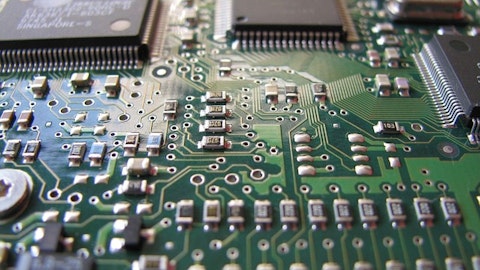Cepton, Inc. (NASDAQ:CPTN) Q2 2023 Earnings Call Transcript August 7, 2023
Cepton, Inc. misses on earnings expectations. Reported EPS is $-0.09016 EPS, expectations were $0.07.
Operator: Greetings, and welcome to the Q2 2023 Cepton, Inc. Business Update and Earnings Call. [Operator Instructions] As a reminder, this conference is being recorded. It is now my pleasure to introduce your host Hull Xu, CFO. Thank you, Hull, you may begin.
Hull Xu: Thank you, and welcome to Cepton’s second quarter 2023 earnings call and business update. With me today are Jun Pei, Co-Founder and Chief Executive Officer; and Mitch Hourtienne, Senior Vice President of Business Development. During the call, we may refer to our unaudited GAAP and non-GAAP measures in our earnings release. The non-GAAP financial measures should not be considered as a substitute for or superior to the measures of financial performance prepared in accordance with GAAP. Reconciliations for non-GAAP measures are included in our earnings release. I would like to remind everyone that comments made in this conference call may include forward-looking statements regarding the Company’s expected operational and financial performance for future periods.
These statements are based on the Company’s current expectation and are subject to the Safe Harbor statements, relating to the forward-looking statements contained in our earnings release and the slides that accompany this call. Actual results for future periods may differ materially from those expressed or implied by these forward-looking statements due to a number of risks, uncertainties or other factors, including those discussed in the earnings release or during today’s call, and those described in our filings with the U.S SEC. We are not undertaking any commitment to update these statements as a result of future events except as required by law. As a quick reminder, this call is being recorded, and you can find the earnings release and slides that accompany this call as well as a Webcast replay of this call at investors.cepton.com.
Now I’d like to turn the call over to Jun.
Jun Pei: Thank you, Hull, and good afternoon, everyone. Thank you for joining Cepton’s second quarter 2023 earnings call. We will provide a business update and review our second quarter financial results with you. Starting off, I’m proud to announce that we have delivered a new company record for the quarterly product revenue and gross margin. This quarter, we shipped the highest number of LiDAR units to both of our automotive and the smart infrastructure end customers since our inception. In Automotive, we expect our shipment volumes to be more than double for each sequential quarter for the remainder of this year as our OEM customers look to launch the startup production at the end of this year. On Smart Infrastructure, we’re executing our multimillion dollar contract from our largest holding customer.
This is the largest commercial deployment of our LiDARs to date for the tolling application. We have discussed with you our expected growth this year over the past few quarters. This time, I will let the results speak for themselves. Our record setting quarters reflects the hard work and dedication put forth by our teams executing our current programs. We expect this trend to continue for the remainder of the year, as we continue to ramp unit volumes for automotive series production, as well as for smarter infrastructure projects. On series production execution, we remain on track to fulfill orders for OEM start of production at the end of this year. We shipped the highest number of pre-production units this quarter in support of our lead OEM program, resulting from our continued commercialization efforts to increase our production capacity.
This quarter, we internally developed and deployed automated manufacturing equipment to our contract manufacturing partners in order to meet series production order volumes. Automation of our manufacturing processes is a increasing priority for our hardware and software teams as unit volume continued to increase. This quarter, our development efforts have expanded into testing and calibration equipment. LiDAR sensors are highly sophisticated instrument that require the expertise of our engineering teams to maintain the required level of precision in all manufacturing steps by investing our time and resources, our custom manufacturing solutions are scalable across different products maximizing production efficiency and minimizing physical footprint.
We remain confident in meeting our production milestones for the remainder of the year. Last quarter, we announced our point cloud processing ASIC that we developed in-house specifically for our LiDARs. This quarter, we completed the engineering validation of this ASIC into our near range Nova product. We have successfully integrated new ASIC into our Nova B samples, and began shipping units to our lead autonomous ground vehicle OEM customer. We expect our new X90 product line to start shipping with this ASIC by the end of this year. Across our automotive OEM customers, we’re seeing increasing interest in perception solutions, and we are developing automotive perception software by leveraging our proven smart infrastructure software solutions.
LiDAR sensors vary in many different dimensions, from scanning patterns to point cloud density. This has created the need for a plug and play solution that can easily integrate into the broader ADAS software stack. In addition, automotive OEMs have the unique challenge of synchronizing multiple sensor types. We are proud to be one of the core building blocks, providing valuable input data to help save lives. Please stay tuned for our further progress. Our accomplishments this quarter are certainly worth highlighting. But the record quarters like this one are just the beginning of our company. We will continue to scale our business throughout the remainder of the year. This year, there are a number of automotive programs up for grabs. We believe our extensive LiDAR portfolio of short, medium and long range LiDARs in combination with our experience in executing automotive production program positions us to win additional series production awards.
With that, I’ll turn it over to Mitch for details on our efforts with our customer programs.
Mitch Hourtienne: Thank you, Jun. This quarter, our lead OEM production customer revealed the third contracted vehicle model plan to incorporate our LiDAR and you’ll see a few more details in a few days. Recent announcements such as this one has led to accelerated interest from major car OEMs competing in the U.S market. The race for safe autonomy is really front and center now, especially here in the U.S market. Outside of China, the U.S market continues to be the biggest for the Level 2 plus and Level 3 ADAS feature set. This quarter we received an RFI from one of the largest automotive OEMs in the world. This RFI was specifically driven by the U.S arm of this OEM. Another strong indication that the U.S market competition is pressuring international automakers to consider their U.S offerings to include LiDAR for their next-gen Level 2 plus and Level 3 ADAS systems.
For our existing RFIs and RFQs, we completed multiple onsite technical reviews this quarter with several top 10 OEMs. Specifically, we are in the final round discussions with what we believe to be the largest open automotive OEM series production award this year. Echoing Jun’s comments earlier, we are uniquely positioned to win because of our experienced launching at a North American OEM, General Motors and our strong partnership with Koito manufacturing. Our industry leading form factor for behind the windshield integration, coupled with our multi year journey down the cost walk path affords us the opportunity to really be in the final sourcing conversations across multiple OEMs. When we get to this final point and major source things, I remain confident that we really have built everything, from our technical prowess, to our commercial strategy to our Tier 1 partnership, the strongest in this industry to match what these customers are striving for, and result in positive outcomes for Cepton for the OEMs and ultimately, for the consumers that will become safer and more comfortable by the Cepton LiDAR enabled features.
I’m very hopeful that in the near future, we will be announcing our LiDAR will be used on even more American cars and trucks. On the Smart Infrastructure side, we had record level shipments to our largest commercial contract in the tolling application, which we believe to be the largest for this type of LiDAR application. In tolling, our LiDAR sensors enable free flow tolling without the need for human assisted tolling lanes. Our sensors are also used to measure traffic data, and incorporate road usage data for predictive analytic applications, like road maintenance optimization. The biggest advantage of why LiDARs work better than cameras is that traffic data can be measured at night and during inclement weather conditions. Further, our LiDAR has the ability to detect the number of axles the vehicles passing through, as well as taking detailed height measurements.
These features help systems integrators improve on billing, and improve safety in areas where their height clearance requirements such as bridges and tunnels, our LiDARs are currently being deployed across the U.S and we’re in discussions to expand into additional states and countries over the next 6 to 12 months. Finally, I’m happy to report that we recently received our first production order for LiDAR installations across multiple airports in the U.S. This is an emerging application for our products, and we look to share more information with you in future announcements. Next, I’ll turn it over to Hull.
Hull Xu: Thank you, Mitch. Starting with our second quarter results. Total revenue for the quarter was $2.8 million, an increase of 9% compared to the prior year period, and 88% compared to our previous quarter. Quarter revenue was $2.8 million, a new record for the company, an increase of 92% compared to the prior year period, and 123%. compared to our previous quarter. Our strong product revenue growth was driven by an increase in our average selling price for commercial deployments and product mix shift more in favor of Smart Infrastructure. There was minimal development revenue which is based on timing of completion on all outstanding projects. We achieved a record gross margin of positive 15.6% on a GAAP basis, primarily driven by revenue mix shift between automotive and smart infrastructure customers, and fixed costs leverage on the record level of unit shipments.
As our sales volume shift in favor of automotive OEM customers for the remainder of the year, our ASP is expected to decrease as incremental production milestones are met and we begin to sell at production volume prices. As a result, we expect gross margin to decrease in the short-term followed by a rebound as unit volumes grow and economies of scale is achieved. Second quarter GAAP net loss was $14.2 million or $0.09 per share basic and diluted. Non-GAAP net loss was $11.8 million or $0.08 per share basic and diluted. Second quarter non-GAAP adjusted EBITDA was negative $12.6 million. As of June 30, 2023, we had available liquidity of approximately $168 million. Total Available liquidity consists of approximately $70 million in cash and short-term investments and a commitment to purchase up to 98 million in equity for Lincoln Park Capital.
And with that, I’d like to open the call for questions.
Q&A Session
Follow Cepton Inc. (NASDAQ:CPTN)
Follow Cepton Inc. (NASDAQ:CPTN)
Receive real-time insider trading and news alerts
Operator: [Operator Instructions] Thank you. Our first question comes from Matthew Galinko with Maxim Group. Please proceed with your question.
Matthew Galinko: Hey, thanks for taking my questions. I was — I wanted to touch on you talked about kind of the gross margin dynamics we should expect through the balance of this year. In terms of gross margin scaling back up as automotive volumes ramp up, are you sort of able to get there on your existing OEM relationship? Or do you expect you need more volume from additional wins to sort of get to, sort of high volume expected gross margin. And to the extent that you could say, what kind of margin range can we expect that at maturity?
Jun Pei: Yes. Hey, Matt, thanks for the question. Yes, the short answer is that, yes, we can get there from our existing contract with GM. Obviously, more units will be helpful. But we do expect to get to mid 40s gross margin, somewhere around 20, 25-ish, depends on volume, obviously.
Matthew Galinko: Got it. Okay. That’s helpful. And then in terms of the outstanding decisions that you’re expecting to be made, I guess, through the balance of this year, can you give us some sense of do you feel you have a leading position in some or a number of them? How many are you working towards? Just any more color you could provide on what you’re working on today?
Mitch Hourtienne: Yes, Matt. This is Mitch Hourtienne. So I made some comments on that earlier. So we are in the final round at what we believe to be the biggest automotive opportunity to be sourced this year. Yes, of course, we are hopeful we’re in a leading position because of our experience on the General Motors project, working with Detroit OEMs and our partnership with Koito. So we are in good shape. And then, yes, we are in final rounds at multiple OEMs is what I mentioned. And I think the comments are the same there. Everyone values the relationship with Koito, the technology evolution from our lead program at GM. And we’re going to be one of the leaders in this space in the next few years.
Matthew Galinko: Got it. That’s helpful. And maybe last question for me. On the smart tolling contract that I think we’ve talked about over the last quarter, I think we talked about there being potential for expanded scope within that contract. It sounds like it’s progressing relatively well from your comments, but just curious if there’s opportunity for expanding that scope in mid-2024 or how we should be thinking about timing of that.
Hull Xu: Yes. Good question. We did recently meet with the executives from this lead customer. We only have a small fraction of their available market share even in the U.S. So we did talk about those expansion opportunities both in the U.S. and abroad. There are some opportunities in Eastern Europe and Southeast Asia that should be coming in early 2024 as well. So we think that business can be four or fivefold the current contract in the short-term.
Matthew Galinko: Great. Thank you.
Operator: Thank you. At this time, there are no more questions. I would like to turn the floor back over to Hull Xu for closing comments.
Jun Pei: Actually, I’ll…
Hull Xu: Actually, it looks like there’s a question in the queue is coming.
Operator: Apologies. They just went in. All right. Our next question is Richard Shannon with Craig-Hallum Capital. Please proceed with your question.
Richard Shannon: Well, thanks guys for taking my questions. I guess I have to signal a few times to get one in, but [indiscernible] guys.
Jun Pei: Hi, Richard.
Richard Shannon: Hi. Let’s see here. A couple of questions from me. I may have missed the comments, and I can’t remember if it came from Hull or Mitch, but I think you talked about even it’s doubling here in the next couple of quarters. Is that specific to the automotive TAM or to the total business?
Mitch Hourtienne: Yes, I believe it was — Richard, this is Mitch. I think it was in Jun’s commentary about doubling our automotive volume shipments each sequential quarter the rest of the year. So that’s specific to the automotive OEM business that we have.
Richard Shannon: Okay. And you’ve talked about in the past related to your early first major automotive win here, you talked about kind of having 10,000-plus units in the order book here. Would you update that number? Does it sound like it’s going to be more like 20,000? Or do you want to update us on how we should think about that number?
Hull Xu: No, we are going to keep that number for now.
Richard Shannon: Okay. Fair enough. So you did update us on the yearly guidance number, which I’m assuming you still want to keep in place, I think, 15 to 20. So with a fairly good number for the second quarter in automotive doubling, what does that say about the smart infrastructure business? Was this a large order you’re fulfilling in the second quarter? And then winning for some of these new orders that come in, airports or tolling? Or how do we think about the progression of that automotive segment here?
Hull Xu: So we are not changing any guidance for the year, first of all. The smart infrastructure shipments, that is largely from the tolling contract, which we had since the end of last year. So most of that contract will be shipped this year. I think two-third of it will be shipped this year and one-third will be next year. So the automotive units are going to increase in Q3 and Q4 as we ramp up the current program.
Richard Shannon: Okay. All right. Fair enough. And then you talked about — I think this was the first time you talked about an airport opportunity, which I think I have some familiarity with there. But if you think, especially Mitch, relative to your comments about the tolling opportunity having a 4 to 5x multiplier effect if you can get more share or get more international business there, how do we think about the total airport opportunity over a couple of years period of time relative to the opportunities you have in tolling? Are they commensurate or one much larger than the other?
Mitch Hourtienne: Yes, good question. I think at the beginning, they’re commensurate with the tolling application. There’s probably 1 to 2 dozen major airports that are strongly considering adopting LiDAR technology, but then there’s probably also a dozen applications within the airport itself. So it’s going to start off in a few thousand unit range here at the beginning.
Richard Shannon: Okay. Fair enough. Then, one last big picture question for me, just related to your large automotive customer, GM. I think there’s a well-known contract out there with another smaller OEM with a public LiDAR company that’s had a delay in deploying its LiDAR due to some software, somewhere in the system there. I wonder if you could make some comments about how you see General Motors dealing with the software and integration of all the other sensors you can make up with the cohesive system? And to what degree are you seeing any issues that they may be having or seem to avoiding? I think it’d be great to hear, please.
Mitch Hourtienne: Sure. Yes, I think there’s a couple of different approaches out there amongst the OEMs. One is they do all the sensor fusion and perception software in-house, which is the case for General Motors. Some smaller OEMs opt to buy pieces of the perception software from the sensor providers, like is the case with a few of our competitors. And I do think that, that creates a bit of a risk when there are software issues. They can’t be solved in-house by the OEM. They have to be solved together with these smaller supplier companies. So I think that’s what we’ve witnessed in that case that you’re talking about. In regards to General Motors, again, they do all of the sensor fusion and perception software in-house. So they have a lot more control, a tighter grip on the end results. So I think that’s maybe why you haven’t seen similar issues publicly from General Motors.
Richard Shannon: Okay. Fair enough. I appreciate all the detail. That’s all for me guys. Thank you very much.
Operator: Thank you. Our next question comes from Gus Richard with Northland. Please proceed with your question.
Gus Richard: Yes. Thanks for taking my questions. Could you give us the mix between infrastructure and auto in the quarter in terms of revenue?
Hull Xu: Yes, hey, Gus. This is Hull. The unit mix, it’s about two-third, one-third, two-third automotive and 1/3 smart infra.
Gus Richard: Okay, got it. And then you had a couple of site visits. I know your potential customers are going through their process. Can you give us a little bit of a sense of sort of what they need to do to sort of come to a conclusion? And sort of what do you think the timing of decisions are for the people you’re talking to?
Mitch Hourtienne: Yes, it’s a good question, Gus. This is Mitch. So the timing for the biggest opportunity is probably the quickest. I would say within the next couple of months. There will be a decision. It’s quite a lengthy process inside the OEMs. There’s nothing unusual this time around. I think we experienced a similar time line with our initial contract, so we kind of know the process. And again, Koito is part of this process as well as our preferred Tier 1 partner. Some of the other opportunities could be closer to the end of the year for their decisions. And again, nothing out of the ordinary on the processes. These typically take 6 to 12 months.
Gus Richard: Got it. And then in terms of your ability to ramp output, do you see any constraints in the near-term? Or are you getting everything, your ducks in a row, to ramp as your volume increases?
Mitch Hourtienne: Yes. I think we — of course, we’ve had challenges. That’s the fortunate position we’re in, as we have Koito helping us with the supply chain. So they’re really helping us put everything in order. We’ve met all the deliveries to the OEM at this point, and we are not very high on their concerns’ list. If you look at things like OTM battery packs, I think those are a lot higher concern than anything like a Cepton LiDAR.
Jun Pei: Yes. And Gus, Jun here, just to supplement what Mitch said. I did mention that a lot of the engineering effort within the company is slowly, but surely emphasizing the production efficiency, production tooling, manufacturing, automation. All of these efforts are actually ongoing and will continue to go as the volume cranks up. So all of those are — very fortunately for us will be taken care of.
Gus Richard: Got it. Thank you. That’s very helpful. I think that’s it for me.
Gus Richard: Thanks, Gus.
Operator: Thank you. Now I believe that there are no further questions at this time. I would like to turn the floor back over to Jun Pei for closing comments.
Jun Pei: Yes. Again, thank you, everyone for attending this call. It’s quite a meaningful quarter for us and an exciting time for Cepton. So as I said, this was just the beginning. There will be more, a lot more to come. So have a great day, everyone. Thank you.
Operator: Thank you. This concludes today’s teleconference. You may disconnect your lines at this time. Thank you for your participation.
Follow Cepton Inc. (NASDAQ:CPTN)
Follow Cepton Inc. (NASDAQ:CPTN)
Receive real-time insider trading and news alerts





